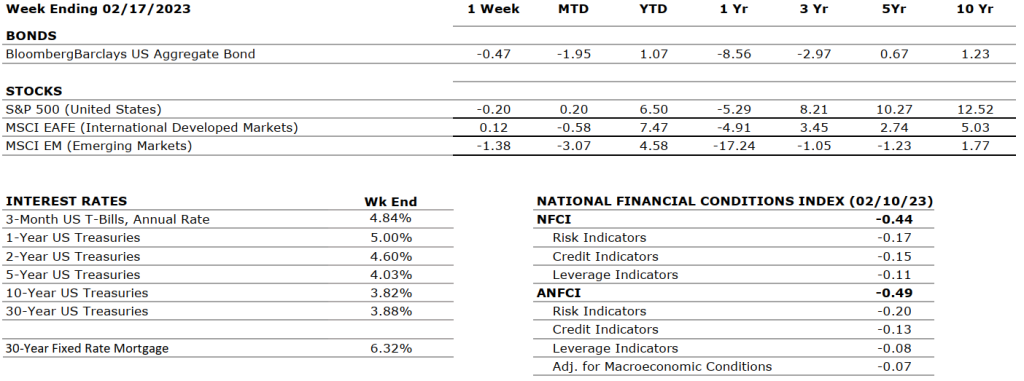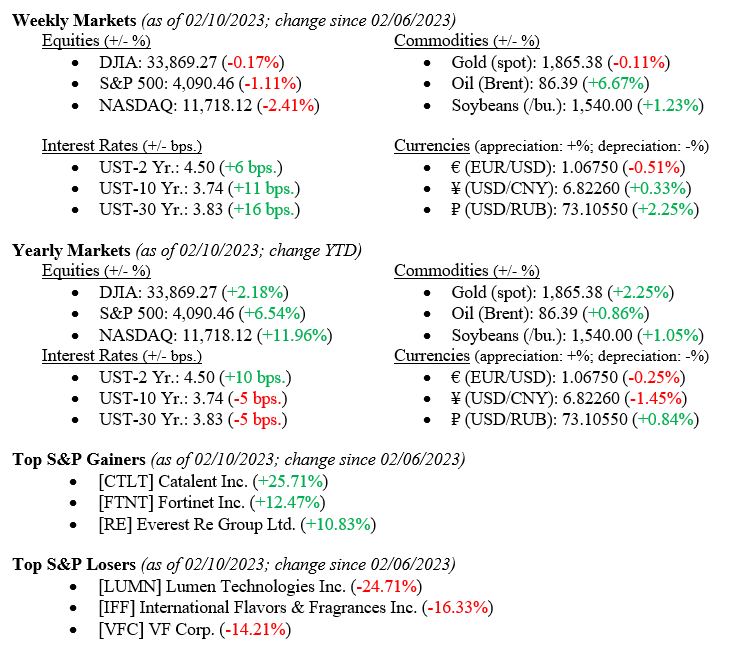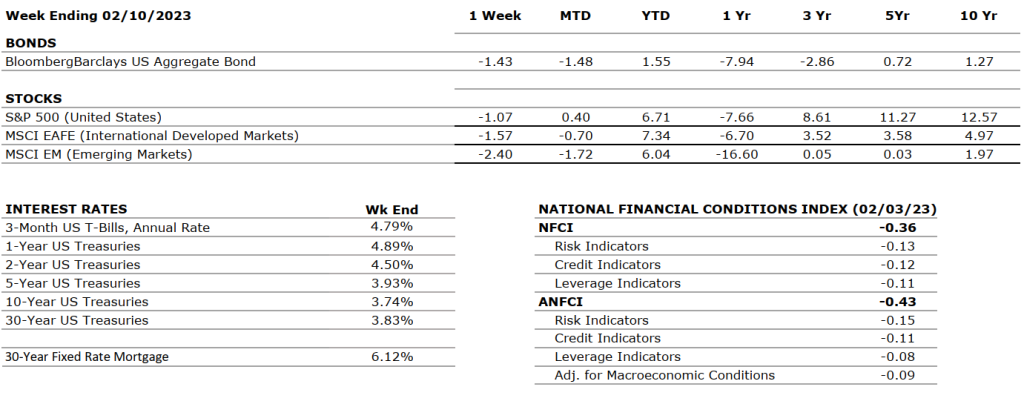THE NUMBERS

The Sources: Index Returns: Morningstar Workstation. Past performance is no guarantee of future results. Indices are unmanaged and cannot be invested into directly. Three, five and ten year returns are annualized. Interest Rates: Federal Reserve, Mortgage Bankers Association.
MARKET HEAT MAP
The health of the economy is a key driver of long-term returns in the stock market. Below, we assess the key economic conditions that we believe are of particular importance to investors.
|
US ECONOMY |
||
|
CONSUMER HEALTH |
NEUTRAL |
Real gross domestic product (GDP) increased at an annual rate of 2.9 percent in the fourth quarter of 2022 after increasing by 3.2 percent in the third quarter. The increase in the fourth quarter primarily reflected increases in inventory investment and consumer spending that were partly offset by a decrease in housing investment. |
|
CORPORATE EARNINGS |
NEUTRAL |
The earnings growth rate for Q3 2022 was 2.4%. For Q4 2022, earnings are expected to decline by -4.7%, up from the previous estimate of -4.9%. This would be the first negative growth since Q3 2020 (-5.7%). So far, 82% of S&P 500 companies have reported actual results — 68% of companies beat EPS estimates and 65% beat revenue expectations. |
|
EMPLOYMENT |
POSITIVE |
U.S. Nonfarm Payrolls for January 2023 increased by 517,000, almost three times the expected number of 187,000. The unemployment rate fell to 3.4% from 3.5% and is now the lowest in 50 years. Leisure and hospitality, health care, professional services, and government were among the sectors with the most notable gains. |
|
INFLATION |
NEGATIVE |
The annual inflation rate in the U.S. increased by 6.4% for January 2023 compared to the December 2022 reading of 6.5%. This is the lowest CPI value since October 2021. Core CPI increased to 5.6% versus 5.7% in December. The primary contributors to the increase in inflation were shelter, food, gasoline, and natural gas. On the other hand, indexes for used vehicles, medical care, and airline fares decreased over the month. |
|
FISCAL POLICY |
NEUTRAL |
A few weeks after taking control of the chamber, GOP lawmakers are pushing for austerity measures in hopes of improving the nation’s fiscal health. Democrats have responded with harsh criticism and stressed that they would not negotiate a deal with Republicans involving reductions of benefits. Meanwhile, the latest CBO projections show that rising interest rates and spending bills are adding to deficits as the U.S. is on track to add $19 trillion of new debt over the next decade. |
|
MONETARY POLICY |
NEGATIVE |
Earlier this month, the Fed approved a 25-bps rate hike taking its target range to 4.50%-4.75%. Although the magnitude of rate hikes has been decreased, rates are likely to be kept higher through 2023 with no reductions until 2024. The FOMC has also reiterated its strong commitment to return inflation to its 2% objective. |
|
GLOBAL CONSIDERATIONS |
||
|
GEOPOLITICAL RISKS |
NEGATIVE |
While the Russian-Ukraine conflict does not show signs of abating, additional geopolitical issues have arisen in South America with the violent protests that hit the capital of Brazil. Following the October 2022 elections won by the left party, Jair Bolsonaro’s far-right supporters stormed Brasilia accusing the winning candidate and party of corruption. Bolsonaro is currently in Florida and has communicated little publicly. |
|
ECONOMIC RISKS |
NEUTRAL |
Although the afore-mentioned geopolitical risks remain prevalent in everyday news, their effects on the global economy seem to have subsided. China abandoned its zero-Covid policy, which will positively impact the supply chain and the economy as a whole. The European economy also appears to be healthier than expected, partly due to an unusually warm winter that has provided some relief on increasing energy prices. |
The “Heat Map” is a subjective analysis based upon metrics that VNFA’s investment committee believes are important to financial markets and the economy. The “Heat Map” is designed for informational purposes only and is not intended for use as a basis for investment decisions.








